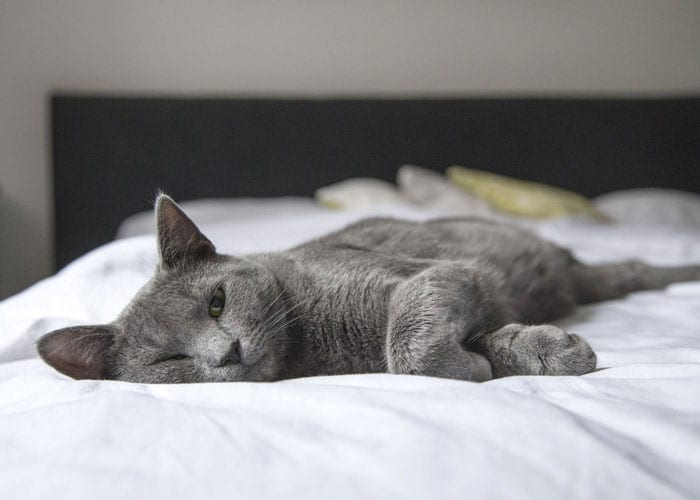Owning a cat is fulfilling and challenging at the same time. The affection and endless cuddles you get are the fun part.
Oppositely, having to deal with cat scratches, ‘cattitude’, and a host of behavioral issues can be quite a tall order.
Additionally, being a cat parent means making great compromises regarding your comfort and safety. An example is decorating your house or garden with beautiful flowers and plants.
Cats are extremely sensitive to certain plants. Some can cause fatal symptoms upon ingestion while others trigger skin reactions.
Lilies are among the top plants that don’t agree well with our feline friends. The entire plant is dangerous and can cause acute kidney failure when ingested.
However, the term lily is an umbrella of many flowers. Thankfully, not all flowers with the term “lily” on their names are necessarily poisonous to cats.
Here, we focus on an exceptional bloom called the Oriental lily. Specifically, is it toxic to cats?
What Are Oriental Lilies?

Oriental lilies are sweet-smelling, flamboyant, and incredibly beautiful blooms.
The flowers are large, upward or outward-facing, and rich in color. You will get them in pink, red, white, pastel yellow, and more.
Besides being intensely rich in color, Oriental lilies are also very fragrant. All these reasons make them great as cut flowers among florists.
They are late bloomers, often displaying their large and open flowers in mid-late summer. Some varieties go all the way to fall.
The flowers bloom just when another variety, the Asiatic lilies are fading away. The latter bloom in spring and early summer.
Oriental lilies are actually confused with Asiatic lilies. This is because both flowers are similar in more ways than one. Their blooms bear the same colors and appearances.
However, the two are different from each other. For one, Oriental lilies originate from Japan while Asiatic lilies are native to many Asia n regions.
The former is also much taller and more fragrant than the latter.
Is It Poisonous To Cats?

As mentioned before, lilies, in general, are poisonous to cats.
According to the American Society for the Prevention of Cruelty to Animals (ASPCA), all the members of the true lilies family (genera Lilium) and Hemerocallis fall in the category of dangerous plants.
These include stargazer, Easter lily, Asiatic, daylilies, Japanese, and rubrum, among others. Oriental lilies fall in this category.
The MSPCA also agrees that this specific group of flowers is dangerous to cats as well.
It is thus safe to say that Oriental lilies are harmful to your cat.
Like all lilies, these large colorful blooms are toxic in minimal amounts. Ingestion of 1-2 leaves of a few pollen grains can cause kidney failure within three days.
Additionally, all parts of the lily are toxic to the cat including the leaves, stem, pollen, and water.
For people that love placing their lilies in a vase with water, keep the cat from licking the water as well. This, too, can prove to be dangerous to your kitty.
Toxicity Explained
When a cat ingests Oriental lilies, a certain poison in the flower will terribly affect the normal functioning of his kidneys.
In simple terms, the poison causes acute kidney failure. The poison is yet to be identified but Pet Poison Helpline states on its website that it is water-soluble.
After ingestion, your cat will start to throw up really badly. He may also show other symptoms such as lethargy and lack of appetite. This happens within 6-12 hours of ingestion.
After a while, the symptoms will die down a little only to come back fiercer and stronger.
Acute failure causes the cat to urinate too much or not urinate at all.
If nothing is done at this point, the symptoms will continue to worsen.
You may observe seizures, inflammation, and other fatal symptoms.
Within three days of ingestion of the lily, the cat is likely to die.
Learn More Here: How Much Lily Pollen Is Toxic To Cats?
What to Do In Case Of Ingestion
If you have Oriental lilies in your garden or keep some bouquets at home, you need to look out for any sign of poisoning and act immediately.
If the cat displays such symptoms as lethargy, vomiting, or extreme lack of appetite, don’t take any chances.
Even if you are unsure of what causes the symptoms, err on the side of caution.
As we alluded to before, licking only 1-2 leaves or pollen grains can cause great damage.
Contact your vet or better still, rush the cat to the emergency room.
The vet will administer IV fluids to maintain kidney function, get rid of the toxin from the cat’s body, and monitor the kitty closely.
Are Stargazer Lilies Poisonous To Cats?
As aforementioned, true lilies (Lilium spp.) is a genus that includes tiger, easter, oriental, and stargazer varieties.
All parts of the plant (the bulbs, stems, leaves, flowers, and even the pollen) contain toxins that can cause kidney failure in cats.
Even a small amount of stargazer lily can be deadly to a cat, so it is important to keep them out of reach.
If your cat consumes a true Lilly, her body will create a toxic compound called oxalate that can cause kidney failure.
This type of reaction is unique to cats and this explains why cats are the only animals that are susceptible to lily poisoning.
The symptoms of lily toxicity include vomiting, diarrhea, lethargy, and loss of appetite.
If you suspect that your cat has ingested any part of a stargazer lily, contact your veterinarian immediately.
With prompt treatment, your feline friend should make a full recovery. However, if left untreated, stargazer lily poisoning can be fatal.
Closing Thoughts
While they are beautiful and sweet-scented, Oriental lilies are some of the most toxic plants around cats.
In case your kitty licks any part of the flower, he will suffer acute kidney failure.
Sadly, this is no condition to joke with. It can take the life of your precious pet and fast.
It is best to keep it off your space altogether. If you must have it, keep a close eye on your cat at all times.

Hi! I am Eleanor Price. I started this website after my cat, Louie, almost died from a case of botulism (a type of food poisoning often caused by bacteria that grow on food items). Turned out that my cat’s diet was the problem. I have made it my duty to provide the best information and recommendations about everything cat lovers need to know about their felines’ health and wellbeing. My goal is to find the most informative content on anything feline-related and share it with fellow hardworking kitty lovers.

